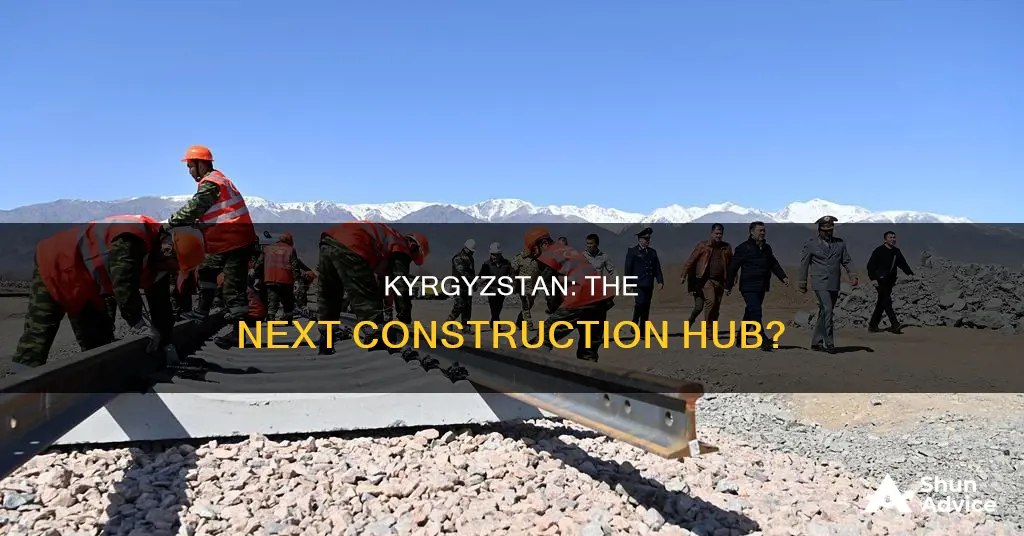
Kyrgyzstan is a landlocked country in Central Asia with a history of political upheaval and economic downturns since its independence in 1991. The country has a democratic and open society, and its transition to a market economy is considered one of the most remarkable in the region. However, it continues to face challenges in attracting foreign investment due to various factors, including political instability, corruption, and a lack of infrastructure.
Kyrgyzstan has a favourable climate, a well-developed agricultural sector, and a growing construction industry. The country is actively seeking foreign direct investment (FDI) and offers equal treatment to foreign investors, with no official limits on foreign control or ownership. The government has implemented laws to attract FDI and has identified it as a key component of economic growth. Additionally, the country has bilateral investment treaties with over 20 countries, including the United States, Germany, Switzerland, and China.
However, there are concerns about the business climate in Kyrgyzstan. The country faces issues such as inconsistent application of laws, bureaucratic hurdles, and aggressive tactics against private businesses, which have raised concerns among foreign investors. Additionally, the country's judicial system is not fully independent and is susceptible to external political influence.
Despite these challenges, Kyrgyzstan remains a frontier market with minimal market entry barriers, lack of restrictions on foreign ownership, and export-oriented tax incentives. The country's commitment to developing its digital economy and enhancing regional trade integration presents long-term investment opportunities in various sectors, including agribusiness, ICT infrastructure, and energy.
| Characteristics | Values |
|---|---|
| Political Stability | Poor |
| Economy | Poor |
| Infrastructure | Poor |
| Bureaucracy | High |
| Corruption | High |
| Foreign Direct Investment | Low |
| Bilateral Investment Treaties | 20+ countries |
| Free Economic Zones | 5 |
| Skilled Labour | Low |
| Cheap Labour | High |
| Natural Resources | Gold, Copper, Water, Hydro Energy |
What You'll Learn

Kyrgyzstan's economic and political instability
Kyrgyzstan has a history of political instability, with several political upheavals leading to the overthrow of presidents in 2005, 2010, and 2020. The country has experienced violent protests, revolutions, and coups, with the most recent one in October 2020 resulting in the removal of former President Soorenbai Jeenbekov. This political turmoil has negatively impacted the country's economy, deterring foreign investment, and creating an unstable business environment.
Economic Instability
Kyrgyzstan's economy has faced significant challenges in recent years, with the COVID-19 pandemic exacerbating the situation. The country experienced a severe economic downturn in 2020, with a GDP contraction of 8.6%. The construction, tourism, and non-gold exports sectors were particularly hard hit. Inbound foreign direct investment also declined sharply, with a reduction of over 50% compared to 2019. The current account deficit has widened, and remittances, which are a crucial source of income for the country, have decreased. Additionally, the country faces a looming debt crisis, with external debts primarily owed to China.
Political Instability
Political instability in Kyrgyzstan has been a persistent issue, with frequent changes in leadership and government structures. The country has had 30 different prime ministers since gaining independence in 1991. Protests and uprisings against government corruption and vote-buying have led to the removal of multiple presidents. The political situation is further complicated by regional divisions, populist movements, and the influence of powerful clans and families.
The frequent political upheavals have created an uncertain business environment, deterring foreign investment. The government's aggressive tactics, including the targeting of foreign businesses through investigations, detentions, and arbitrary fines, have raised serious concerns among investors about the security of their investments. Additionally, the country's legal and regulatory system is underdeveloped, with frequent changes in leadership hindering consistent implementation and enforcement of laws.
Impact on Investment
The combination of economic and political instability has made it challenging for Kyrgyzstan to attract foreign investment, particularly in the construction sector. While the country actively seeks foreign direct investment and has implemented laws to attract investors, inconsistent application of these laws and bureaucratic hurdles deter potential investors. The lack of infrastructure and modern industrial zones, as well as low labor motivation and productivity, further reduce the country's attractiveness for investment.
Kyrgyzstan needs to address these economic and political issues to create a more favorable investment climate. This includes focusing on internal production, developing industrial zones, and providing a low-cost entry for investors, along with ensuring political stability and a transparent regulatory environment.
PewDiePie vs T-Series: Why the Obsession?
You may want to see also

Corruption and government gridlock
Forms of Corruption
Kyrgyzstan suffers from various forms of corruption, including bribery, corporate raiding, and economic crimes such as stealing from the state budget and tax evasion. Bribery among low and mid-level officials is common and widespread corruption helps to limit equality of opportunity. One of the factors contributing to corruption is the possession of the largest gold deposit in Central Asia, Kumtor, which has been involved in many corruption scandals and allegations of corruption among the country's top officials.
Kusturizatsia
A recently emerged concept in Kyrgyzstan is "kusturizatsia", derived from the Kyrgyz word for "vomiting". Kusturizatsia refers to the legalization of corrupt activities by prominent businessmen and politicians, who are given the opportunity to repay a fraction of their stolen proceeds to the state and avoid detention. This process is handled by the State Committee for National Security and the office of the president, who decide whether to legalize an individual's corruption or not. While kusturizatsia has become a popular term in Kyrgyz society and is associated with the idea of justice, it is regarded with suspicion by many prominent lawyers and political scientists due to a lack of transparency around the funds involved.
Impact on Investment
The corruption and government gridlock in Kyrgyzstan have had a negative impact on investment. The country's economy contracted significantly in 2020, with a decrease in construction, tourism, and non-gold exports. Total inbound foreign direct investment in 2020 shrank by over 50%, and the country is facing challenges in stabilizing the economy and recuperating investor confidence. The government's anti-corruption campaign has also raised serious concerns among foreign investors about the security of their investments, with increased detentions and aggressive tactics against private businesses. Additionally, the kusturizatsia policy has reportedly led to a flight of investors from the country, with both foreign and domestic investors leaving for more predictable markets abroad.
Wealthy Investing: Should They Continue?
You may want to see also

Poor infrastructure
Kyrgyzstan's infrastructure is in a poor state, which, along with the country's mountainous geography, impedes trade flows and access to international markets. The country's rail network is underdeveloped, with only two unconnected rail lines, and road transport accounts for 95% of passenger and freight traffic. The quality of existing transport infrastructure is also very poor, with high transport costs. For example, it costs approximately $240 for one tonne of goods to reach 20% of the global GDP from Kyrgyzstan, whereas in Germany, the same access can be achieved for about $30.
The poor infrastructure is also reflected in the country's energy sector. Although Kyrgyzstan has abundant hydroelectric resources, only less than 10% of its potential has been developed so far. The country has limited deposits of fossil fuels and relies heavily on imports of natural gas and petroleum. An antiquated infrastructure and poor management make Kyrgyzstan even more dependent on foreign energy in winter when water levels are low.
The country's irrigation infrastructure is also in poor condition, which is a problem given that agriculture is a vital part of Kyrgyzstan's economy, contributing about one-third of its GDP and more than one-third of employment.
Rust Belt: Why Invest Elsewhere?
You may want to see also

Lack of skilled labour
Kyrgyzstan has a shortage of skilled and educated individuals in its labour market. Many qualified Kyrgyz citizens find more lucrative job opportunities abroad, and the nation's education system has largely failed to keep pace with advancing educational needs within many sectors. This has resulted in a lack of highly qualified local candidates in IT, mining, energy, manufacturing, and construction.
International organisations are generally able to employ competent staff, often bilingual in English or other languages. However, the reliance on expatriates for these skills is a significant drawback for companies looking to invest in the country.
The official unemployment rate in Kyrgyzstan is approximately 7%, though experts estimate the actual number of unemployed individuals exceeds this figure. Approximately 1 million Kyrgyz citizens work abroad due to limited opportunities in the country.
The Kyrgyz government has attempted to address this issue by establishing various committees and councils to coordinate cooperation between business associations and government bodies. However, the implementation of these measures has been inconsistent, and the country continues to face challenges in attracting foreign investment in the construction industry.
Investments: Relationships Need More Than Words
You may want to see also

Foreign investment protection
Kyrgyzstan is actively seeking foreign direct investment (FDI) and has implemented laws to attract foreign investors. The country has a Bilateral Investment Treaty with the US, which has been in force since 1994, and offers reciprocal protection of investment. The National Investment Agency (NIA) under the office of the President of the Kyrgyz Republic serves as a vehicle for maintaining an ongoing dialogue with foreign investors and advocates for investing in the country. The NIA also assists investors with bureaucratic procedures and has investor support programs to help guide investors through the registration process.
However, foreign investors may be subject to greater scrutiny than domestic investors, and the country faces challenges in providing a sound enabling environment for investment. The legal framework for foreign investment mostly corresponds to international standards, but enforcement of these laws and protection of private and intellectual property rights is weak. Criminal investigations of commercial disputes are not uncommon, and the judiciary is weak.
The government has also been criticised for its aggressive tactics against private businesses, which have raised serious concerns among foreign investors about the security of their investments. There is also a significant capacity gap between the capital, Bishkek, and regional municipalities, particularly in remote, rural areas, which hinders business development.
Kyrgyzstan's investment climate is characterised by considerable risk and uncertain time horizons. Widespread corruption and the uneven application of the rule of law pose major obstacles for the business community. The government's relationship with Centerra Gold, a Toronto-based company and the single largest source of FDI in the country, serves as a bellwether for Western investment.
Protecting Foreign Investment
The following measures can help protect foreign investment in Kyrgyzstan:
- Due Diligence: Conduct thorough due diligence before investing, including assessing the business climate, sector-specific risks, and local regulations.
- Compliance Programs: Establish effective compliance programs or measures to prevent and detect corruption, including bribery.
- Bilateral Investment Treaties: Utilise bilateral investment treaties, such as the one between Kyrgyzstan and the US, which offer reciprocal protection for investments.
- Dispute Resolution: Be aware of the dispute resolution options, including international arbitration, and seek legal advice as needed.
- Risk Assessment: Regularly assess the political, economic, and security risks in the country, as these can impact the investment environment.
- Insurance: Consider investment insurance or guarantees, such as those offered by the US International Development Finance Corporation (DFC), to mitigate risks.
Retirement and Investment Trends
You may want to see also
Frequently asked questions
Kyrgyzstan has a growing economy, a burgeoning tech scene, and a young, educated population. The country also has a stable political situation and a consolidated presidential form of government. The country's economy grew at an estimated rate of 6.2% in 2023, and investment and exports are expected to drive growth in 2024. The country's transition from a centrally planned to a market economy has been remarkable. The business legal and regulatory framework, however, is still considered inadequate, and the country ranks 140th out of 180 in the 2022 Corruption Perception Index.
The key industries in Kyrgyzstan include software development, agriculture, tourism, gold mining, hydro energy, and stockbreeding. The country also has a strong agricultural sector and a growing textile industry.
While Kyrgyzstan's real estate market is generally considered stable and safe for foreign investors, there are some risks to consider. The business legal and regulatory framework is inadequate, and the country's judicial system is susceptible to external political influence. Additionally, environmental disputes over mining activities have been increasing in recent years.
There are several opportunities for investing in building construction in Kyrgyzstan, including residential properties in the city center, commercial real estate, hospitality sector development, real estate development projects, and renovation projects.







